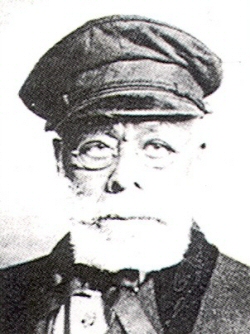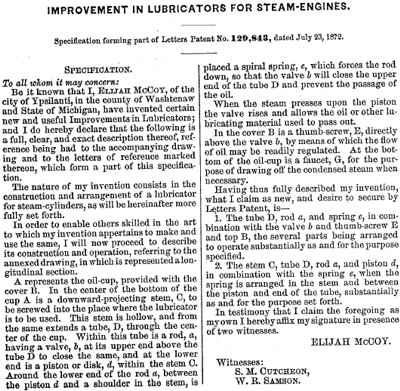Elijah McCoy: Difference between revisions
No edit summary |
No edit summary |
||
| Line 5: | Line 5: | ||
== '''Biography''' == | == '''Biography''' == | ||
Elijah McCoy was a mechanical engineer who literally became a household name. Born in Colchester, Ontario, Canada on 2 May 1844, McCoy was also the son of former slaves (his parents had fled Kentucky for Canada on the Underground Railroad). Unlike other African-American pioneers, McCoy received a formal education in Scotland, where he won the credentials of a master mechanic and engineer. | |||
Following the Civil War, he returned to the United States and settled near Ypsilanti, Michigan, outside of Detroit. Despite racial prejudice, he obtained a job as a fireman and oiler on the Michigan Central Railroad in 1870. Work as a fireman was a far cry from engineering, but gave him ideas for making the lubrication of moving parts much easier. | |||
Eventually, McCoy established his own firm, which received 57 U.S. patents-- 28 of which he held himself. Most of McCoy's patents dealt with lubricating devices. His first invention, a lubricator for steam engines built in 1872, became perhaps his best known. This invention enabled machines to remain in motion while they were being oiled, making them more reliable and less prone to catastrophic failure. | |||
McCoy’s lubricator became so popular that people inspecting new machines often asked if the equipment contained “the real McCoy,” a reference that since has become a common American expression. Elijah McCoy died on 10 October 1929 near Detroit, Michigan.<br> | McCoy’s lubricator became so popular that people inspecting new machines often asked if the equipment contained “the real McCoy,” a reference that since has become a common American expression. Elijah McCoy died on 10 October 1929 near Detroit, Michigan.<br> | ||
McCoy was remembered in Detroit long after his death. In 1975, the city celebrated Elijah McCoy Day, as officials placed a historic marker at the site of his home. The city also named a street for him. These posthumous honors were modest, but they came a century after his invention of the lubricating cup, and demonstrated his enduring legacy. | |||
[[Image:Mccoy patent2.jpg|center]] | [[Image:Mccoy patent2.jpg|center]] | ||
Revision as of 15:35, 3 September 2008
Biography
Elijah McCoy was a mechanical engineer who literally became a household name. Born in Colchester, Ontario, Canada on 2 May 1844, McCoy was also the son of former slaves (his parents had fled Kentucky for Canada on the Underground Railroad). Unlike other African-American pioneers, McCoy received a formal education in Scotland, where he won the credentials of a master mechanic and engineer.
Following the Civil War, he returned to the United States and settled near Ypsilanti, Michigan, outside of Detroit. Despite racial prejudice, he obtained a job as a fireman and oiler on the Michigan Central Railroad in 1870. Work as a fireman was a far cry from engineering, but gave him ideas for making the lubrication of moving parts much easier.
Eventually, McCoy established his own firm, which received 57 U.S. patents-- 28 of which he held himself. Most of McCoy's patents dealt with lubricating devices. His first invention, a lubricator for steam engines built in 1872, became perhaps his best known. This invention enabled machines to remain in motion while they were being oiled, making them more reliable and less prone to catastrophic failure.
McCoy’s lubricator became so popular that people inspecting new machines often asked if the equipment contained “the real McCoy,” a reference that since has become a common American expression. Elijah McCoy died on 10 October 1929 near Detroit, Michigan.
McCoy was remembered in Detroit long after his death. In 1975, the city celebrated Elijah McCoy Day, as officials placed a historic marker at the site of his home. The city also named a street for him. These posthumous honors were modest, but they came a century after his invention of the lubricating cup, and demonstrated his enduring legacy.
Further Reading
1) Eight Black American Inventors.
Robert C. Hayden. Reading, MA: Addison-Wesley, 1972.
2) The Hidden Contributors.
Aaron E. Klein. Garden City, New York: Doubleday, 1971.
3) The Real McCoy.
Wendy Towle. New York: Scholastic, 1993.

